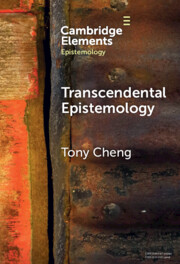Element contents
Transcendental Epistemology
Published online by Cambridge University Press: 16 January 2024
Summary
- Type
- Element
- Information
- Series: Elements in EpistemologyOnline ISBN: 9781009243834Publisher: Cambridge University PressPrint publication: 15 February 2024

